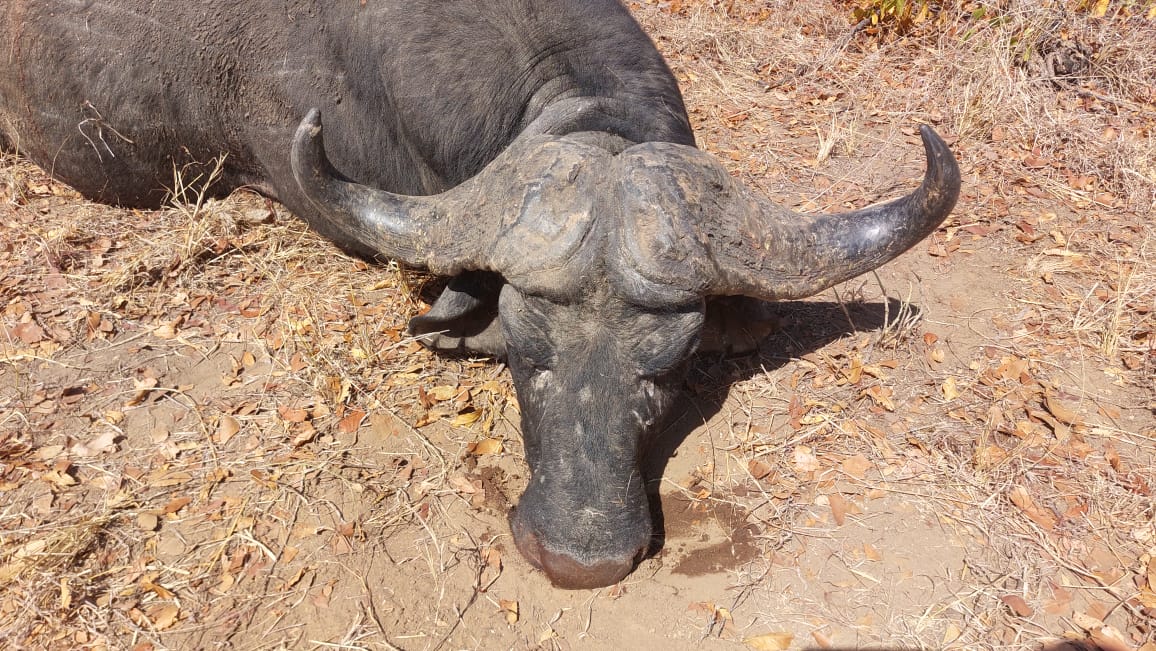
Hunt Cape Buffalo and Tuskless Elephant in Hammond, Save Valley, Zimbabwe.
Hunt not one but TWO members of Africa’s Big 5 !!
1 x Hunter 1 x Professional Hunter *** Trophy Fees Included
This 10 x day, 11 x night dangerous game hunting safari ticks all the boxes for an adrenaline-filled hunting adventure!
10 x Days and 11 x Nights US$ 12,070
Gov Levies on Daily Rates US$ 242
Gov Levies on Accommodation US$ 225
Cape Buffalo Trophy Fee (No size Limit) US$ 7,000
Elephant Trophy Fee US$ 4,000
Gov Taxes on Trophy Fee US$ 220
Return Transfer Hammond/Bulawayo US$ 600
Total Cost US$ 24,357
Meet and greet upon arrival at the airport
Ground transfers to and from Bulawayo to Hammond
Services of a Professional Hunter
Safari camp accommodation
All meals and local beverages
Trophy Fee for Cape Buffalo
Value Added Tax (VAT) on accommodation
Government Levy on Trophy Fee
Government Levy on Daily Rates
Daily Laundry service
International, domestic, and charter flight fees
Ay pre- or post-safari accommodation
Dip and pack of trophies
Gratuities to staff and PH (at own discretion)
Any other fees not specified
Observers @ US$ 250 per day
Firearm import fee
Trophy Shipping Costs
Taxidermy
Cites Tag (+-US$ 250)
National Parks 2% Levy to be charges by Taxidermist/Processing Agent
Park Ranger Fee at US$ 65/hunting day
Hunters have a choice of flying into Bulawayo, where they will overnight, and then be collected and enjoy a 6-hour road transfer to the hunting grounds.
They can also fly into Harare, where they will spend the night before being collected early the following day and transferred to camp on a 6-hour road transfer.
A charter flight can also be arranged from either Harare or Bulawayo. The landing strip is around an hour by road from the camp.
Lastly, a charter flight can be arranged from Johannesburg (South Africa) that will land at Buffalo Range. Upon their arrival in Zimbabwe at the landing strip, an hour’s road transfer is required to camp.
US citizens require a visa to enter Zimbabwe and can be obtained at the major entry points to the country, including Harare, Victoria Falls, and some border posts.
The tourist visa is available for 30 days and is renewable.
The cost of the visa is around US$30
Passports must be valid for at least 6 months from the date of entry required.
This can be obtained in several ways:
On arrival
Online – This method is highly convenient and is recommended to avoid queues
Enjoy the serene wilderness of Zimbabwe, while relaxing at this beautiful lodge, set near the Nyerzi River in Hammond. The accommodation on an African hunt is a hunter’s home-away-from-home, offering a welcome respite from the exhilarating Cape Buffalo Hunt and Elephant hunting safari.
Hunters can enjoy thatched chalet accommodation with comfortable rooms and en-suite bathrooms. Nothing beats a good hot shower and comfortable bed after a day out hunting!
Hearty, nutritious, and delectable cuisine options are the order of the day, with meals being taken in the main dining room, on the deck, in the boma or even in the bush during the hunting safari. Meals may incorporate game meat (venison) from recent hunts; enjoy a wide range of culinary delights during your stay!
Most Zimbabwe hunts are classified as “safari style” which works well with the wild, untamed African destination. Members of the hunting party will set out in a 4×4 vehicle to search for the Cape Buffalo and spoor. Once tracks are spotted, the tracker and team will then set off on foot, using the walk-and-stalk method.
At the end of the day, it is your shot placement that remains critical. Learn all you can about shot placement for Cape buffalo and ensure that you are familiar with and comfortable with your chosen rifle.
While Zimbabwe has no official hunting season, and hunts are allowable 365 days a year, there are definitely times when it is considered a “better” time for hunting. This time period falls in the dry season and usually runs from around April to October.
This is during the cooler winter months, making the safari more manageable in terms of critters and bugs, but the vegetation and grasses are also shorter, allowing the hunter to spot and stalk his prey more easily. In addition to this, the animals are more likely to gather in or around water holes, increasing the opportunities for hunters to complete a successful dangerous game hunting safari.
While elephant hunting in Zimbabwe is an extremely rewarding hunting safari, it is not without danger or challenges. Elephant hunts within the Save Valley can be extremely testing for hunters:
Large Hunting Grounds: The Save Valley Conservancy is approximately 750,000 acres and hunts are free-range across varied terrain. This makes the tracking and location of elephants quite challenging compared to smaller, fenced concessions.
Natural Avoidance: The Elephants within the Save Valley Conservancy are not confined in any way, leading them to be cautious around humans. For hunters, this means that an undetected walk-and-stalk approach and excellent stalking is required.
Challenging Conditions: Heat, together with insects and bugs, can play a role in challenging conditions at certain times of the year.
Conservation Requirements: Hunters need to respect the strict hunting regulations imposed. Anti-poaching patrols, wildlife monitoring as well as hunting quotas are the order of the day when hunting in the Save Valley.
Physical Fitness: The area is home to varied landscapes and terrain, with hunters needing to be physically fit to undertake an Elephant hunt.
Shot placement when on a dangerous game hunting safari is of the utmost importance.
For a hunter that is new to Elephant hunting, the heart/shoulder shot is highly recommended. With a target heart size of around 22 inches in width and 18 inches in length, the heart provides a sizable target area.
If the hunter gets his aim correct, shoots straight and hits the target, the result will be successful elephant hunt.
The target area for the heart, when the elephant is standing broadside, is about ¼ way up from the start of the brisket, to 1/3 to the pinnacle of the back, behind the front shoulder.
Should the hunter pull the shot slightly and it ends up hitting the elephant slightly higher back, the result will be a lung shot.
The rule is to stay below the horizontal halfway point, or else the vital organs, such as the heart and lungs, may be missed.
Know that the elephant will run, so a follow up shot after the initial one must happen as quickly as possible.
This shot placement is highly recommended.
As with any dangerous game animals, when Elephant hunting in Zimbabwe, the minimum legal requirement is a .375 with a 300-grain bullet.
Calibers of 450 and up are recommended, for example the .416 Rigby, .458, or .458 Lott.
Double rifles will also get the job done and are ideal for hunting these large beasts. Consider a 470NE, 500NE, or larger.
Only solid bullets should be used when Elephant hunting.
If you require any further information relating to this dangerous game hunting safari in Zimbabwe, please contact the team at Game Hunting Safaris or message Sean directly.
Please note that terms, conditions and price are subject to change without notice and rates at the time of the hunt will apply
Needing assistance with firearm permits and international travel services, or good taxidermists? View our affiliated companies
View Affiliated Services